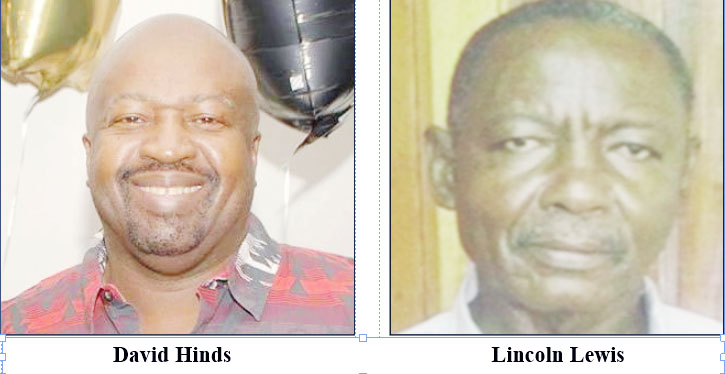Chair of the Guyana Chronicle board, Geeta Chandan-Edmond last night said that there will be an emergency meeting today on a decision by Editor-in-Chief of the state newspaper Nigel Williams to discontinue columns from political scientist Dr. David Hinds and trade unionist Lincoln Lewis.
“The board did not sanction this decision,” Chandan-Edmond told Stabroek, before adding that “the gravity of the situation warrants an emergency meeting at which a way forward will be discussed.”
“It’s a meeting with a single agenda. We first have to establish whether we can rescind i.e. do we have those powers as a board or do those decisions lie solely with the Editor-in-Chief and then move on with the discussion,” she further explained.
The decision, which was communicated to the two writers on Thursday, has been seen as an attempt to censor criticism of government but Williams has said that he is merely freeing space for specialist contributions.
Hinds, a member of the Working People’s Alliance, which is a partner in the governing APNU+AFC coalition, has since 2015 written a weekly column, “Hind’s Sight,” in which he has been repeatedly critical of policy decisions made by the David Granger administration. In a statement to the media yesterday, Hinds noted that an email from Williams informed him that his column would be discontinued from March 12th. Hinds said that his column had not been published over the last two weeks and that while he was not sure whether the decision to discontinue his column was politically motivated, as “a political person who comments on political matters, it is not out of place to speculate that the decision was politically motivated.”
He went on to note that “sometimes junior agents of the government do bad things because they feel that that is what the government wants them to do. So, maybe persons in the management feel that my independent stances which are sometimes critical of the government are not fit for a state-owned entity or maybe they were given directives from above.”
Additionally, Hinds revealed that his relationship with the Chronicle has always been uncomfortable because he is not a yes-man.
“I am independent. Two years ago, the Sunday Editor refused to publish the column that took offence to the president’s summary dismissal of the report and findings of the Walter Rodney Commission of Inquiry (COI). Apparently, the editor felt that I was disrespectful of the President,” he shared.
The political science professor further argued that while he supports the government, he is not muzzled by that support as he lives by the principle that support must not be blind and uncritical.
“That is what drove my columns which are meant to inspire debate, to educate in a popular way and to ask questions of and oversight power. I take those duties seriously, because I feel that a society without them is a dead society,” he said before accusing the Chronicle of practising an editorial policy which is “a mockery of democracy and true independence.”
“The Chronicle has slipped right back to where it was during the Jagdeo years—it has again become an unvarnished mouthpiece of the government. A State-owned newspaper is not a government-owned paper—the government manages the paper on behalf of the State. Hence all stakeholders should have equal coverage and be subjected to the same scrutiny. Unfortunately, this is not the case. News stories on the PPP are often presented with editorial bias. I don’t mind editorials and opinion pieces taking the PPP to task, but news should be free from editorial bias. We fought for these things against the two previous governments. So, it’s sad to see us going right back to those unhealthy practices. It is as if we have not grown up, we have not learned anything from past mistakes,” Hinds argued.
According to him his column and Lincoln Lewis’ are critical to holding the line against that trend thus if the discontinuation of their columns is overtly or covertly motivated by political considerations, Guyana is in a bad place—a sad place.
Development trajectory
Williams, in responding to criticisms of his actions, said he was “taken aback.”
“This is nothing new. Newspapers have in the past discontinued columns when they do not add variety or a different perspective to the discourse,” he said before adding that in its continued re-branding the Guyana Chronicle is seeking columnists who can write specialist pieces in areas following the country’s current development trajectory, which includes areas of oil and gas and national security and specifically border security areas, in the quest to educate the readership.
The Editor-in-Chief stressed that his decision was not an attempt to censor either of the columnists, who remain editorial contributors, but an exercise of the newspaper’s prerogative to “free up space for other contributors.”
“I can say that the decision has nothing to do with their criticism of government,” he said.
He also clarified that the decision was made by editorial management and not the Board. In his letter to the columnist, Williams wrote that the “decision has been arrived at following discussions at the highest level of the company in keeping with policy directions.”
Chandan-Edmond referred to this statement as a misrepresentation.
“I believe the highest body of the company is the board and to say the highest body was consulted is a misrepresentation. The Board was never approached,” she said.
Williams, however, stressed to Stabroek News that “following discussions” at the highest level was not the same as a board decision or directive.
The letter did, however, say that the decision is in keeping with policy directions. Such directions usually emanate from the Board.










